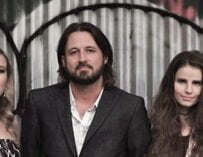
Justin Currie: “Rather depressingly, when I transcribe the piano stuff I write onto the guitar, it’s the same old chords…”
The podcasting duo speak with one of our previous interviewees, the Glaswegian singer-songwriter who fronted Del Amitri for 20 years
Joining our Liverpudlian podcasters for the 85th episode of Sodajerker On Songwriting is the highly respected, Glaswegian singer-songwriter, Justin Currie, who for 20 years fronted one of Scotland’s best-loved bands, Del Amitri, before embarking on a critically lauded solo career. Del Amitri scored a string of hit albums throughout the late 80s and 90s, such as Kiss This Thing Goodbye, Always The Last To Know, Roll To Me, Spit In The Rain, and Nothing Ever Happens – all of which hold up extremely well, all these years later.
Though the band never officially announced the split, they reconvened for a series of triumphant reunion shows in 2013, which prompted Songwriting to speak with Justin in an interview the following year. That feature offered plenty of insight, but here in his chat with Sodajerker, Justin talks more about the mental state required for good songwriting, how Always The Last To Know became an unexpected radio-friendly hit, and why you shouldn’t follow the rules…
We were just revisiting Lower Reaches from a few years back. We remembered there was a song about songwriting on there, but then when we listened back we realised that it isn’t really about songwriting.
“No, it’s not supposed to be at all. But, to be honest, I’ve kind of forgotten what the hell it is about! It kind of alludes to not having any music to listen to, which is a perpetual theme of mine. I don’t think you can write songs if there isn’t anybody else out there inspiring you to do it, and sometimes you go through periods when you don’t hear any good songs written by anybody else and it’s quite demotivating.”
So when you write, is it typically the guitar or the keyboard that you gravitate to?
“Well, it always used to be the guitar and I would always write in one of two tunings: I’d have a guitar set up in DAGDAD or DADGAD and one just tuned normally. Then in the 90s I wrote everything with capos, and then for the last 15 years I’ve been writing on the piano, nearly exclusively, because I don’t really know what the notes are. But, rather depressingly, when I transcribe the piano stuff I write onto the guitar, it’s the same old chords that I would’ve written on the guitar!”
Do you usually have some sort of concept or title first that you try singing about, or will you just look for interesting chord sequences and melodies?
“I suppose, like most writers, I’ve got a book or a phone full of titles and first lines for choruses and things. But, if I’m going through a little writing jag, I’ll tend to try to use those things, and then wander off and end up writing something completely new. Very occasionally I’ll write a verse and a chorus without any melody, and then I’ll go and work out the melody. But often, when I realise I’ve written lyrics on their own, actually the melody is built in somewhere, without me realising it. Whatever produces a ‘thing’ at the end of the day – it doesn’t really matter how you approach it.”
You’ve always had that ability to pick out an interesting melody or an unusual interval. A song like Where Did I Go uses really high notes, even in the first verse.
“That’s quite unusual for me, having that big spread of notes. I suppose, in my mind, there are two approaches to melody writing: one is the Paul McCartney approach where you cover an octave-and-a-half in the melody, and the other is the John Lennon approach where there’s only four notes and they’re all quite close together. You can write a great tune with three or four notes, I think.
“But I don’t really think too much about melody. I’m not very good at sewing melody into a song, because I get a wee bit obsessed about the way the lyrics scan, and making the lyrics sound natural. So if I do start imposing a really interesting melody on lyrics, I get really pissed off because it starts to force the lyrics out of conversational phrasing and into something a bit more kind of like musical theatre, and I don’t like that. I suppose the real genius of people like McCartney is they can make very elegant melodies sound very natural, which I’ve never been able to do.”

Justin Currie: “Recently I’ve been writing songs stupidly early in the morning because my brain’s not screwed on.”
These ideas… Do they hang around for a long time, or are you quite rapid at finishing songs?
“The things I write down in notebooks can hang around for years and years. I’ve still got a book that isn’t quite full, that I’ve had for about 25 years, and it’s really just all titles. Some of them will get used at some point. What I do sometimes is rent a cottage and go away and try to write two or three things a day, and it’s quite handy to have a notebook there to have a list of things. Other things tend to percolate, I guess. They’re swimming around in your head for months or years and then suddenly they came up to the surface.
“The big thing for anybody who’s trying to do something where you’re just making stuff up, is to turn off as much of your conscious mind as possible. That’s when you’re going to get the best result. So I think you do have to play lots of stupid games with yourself. Recently I’ve been writing songs stupidly early in the morning because my brain’s not screwed on – anything to kid your conscious brain into falling asleep.”
We heard you once say that a large part of your process is hanging out and waiting. I’m sure that sounds counter-intuitive to some people, but it’s actually quite important, isn’t it?
“Yeah, I think so. I don’t know whether it’s professional jealousy and resentment, but when I hear songwriters say, ‘I do nine-to-five and I write a song every day,’ that just pisses me off! Especially people like Nick Cave, who write really brilliant songs and use that approach. And then there are people like Elvis Costello who I just think, ‘Why are you writing all those songs?! Just write half of the songs!’
“Back in the A&M days, as soon as we had time off, everybody was waiting for me write songs. So you’re under a bit of pressure to come up with stuff that the band can get their teeth into and then demo and send to the record company. I spent four years, at one point, writing a lot of stuff for the sake of it, and I’ll never do that again because I’ve got reams of songs that just aren’t very good. That’s why I can’t really write to commission… it just seems really unnatural and I’m not very good at doing that. I’d rather let them arrive naturally.”
Always The Last To Know was one you write on your own. Can you talk us through the writing of that?
“Well, that wasn’t a song that I thought was particularly exciting. I knew it had a chorus – I’m not very good at writing choruses – so I knew that was a plus. It was written at a time when we were really obsessed with all the early Faces records, and everything we did we tried to get to sound like the Faces. Then what happened was Gil Norton, the producer, came in and I think he felt under pressure to have something on the record that sounded like a radio hit, so he completely rearranged it.
“About two or three years later, I was listening to the radio and realised he’d completely ripped the arrangement off of, I think, John Waite’s Missing You, which was a big FM radio hit in the 80s. He’d completely, wholesale, lifted that guitar, bass and drums arrangement… and it worked because it was a hit, but it didn’t sound anything like the way the song was written. It’s a very personal song; it’s quite odd that it became a pop hit.”
On your website there’s quite a humorous, tongue-in-cheek essay on how you write a song. Obviously that’s meant light-heartedly, but do you think there is a certain amount of formula one can adopt in order to write a good song?
“No. No I don’t! And I kind of hate any sort of academic approach or systematic approach to writing songs, because some of the greatest, most brilliant radio records ever made are songs that are just all verse and nothing else. Some of the greatest songs ever written don’t really have a tune; some don’t have many lyrics… I mean, if you compare something like It’s A Man’s Man’s Man’s World by James Brown to I Will by Paul McCartney or Desolation Row by Bob Dylan, they’re all utterly different in terms of how they’re structured and what they do, but they’re all brilliant – you can play them all on mainstream radio and people will enjoy listening to them. With weird things like Maggie May, I’ve never really figured out how that song was written, because it doesn’t really have a structure – it’s just got big wodges of verse. It just goes round and round and round, yet it’s absolutely infectious, and those guys wouldn’t have known they were writing a big hit when they wrote that, or that they were writing something that people would identify with. It was just a bunch of lyrics thrown over a nice little chord sequence.
“You can get really tied down on, ‘you’ve got to write a middle eight.’ No, you don’t have to write a middle eight, you don’t have to write a chorus! Or it can be all chorus and no verse. Recently I’ve gone back to writing things where nothing repeats, so each section is its own unique section. For example, with Happiness Is A Warm Gun nothing ever repeats. It’s a bunch of different choruses all stitched together and yet it’s one of the greatest songs ever written. So rules, I think, are definitely a bad idea and if you have to stick to rules then maybe you’re doing the wrong thing? Maybe you should do something else!”

Internationally renowned songwriters are queuing up to be interviewed by Sodajerker, who now have over 80 episodes under their belt. Established in 2012 by Liverpudlian songwriting duo Simon Barber and Brian O’Connor, the Sodajerker On Songwriting podcast has welcomed guests including Lamont Dozier, Neil Sedaka, Johnny Marr, Ben Folds Five, Billy Bragg, Richard M Sherman, Neil Finn, Suzanne Vega, Jimmy Webb, Rufus Wainwright, KT Tunstall and many more.
To find out more about Sodajerker and their work, or to download their podcasts – including the full 56-minute interview with Justin Currie – go to www.sodajerker.com. You can also connect with them on Facebook or Twitter, or download the podcasts from iTunes.































Related Articles